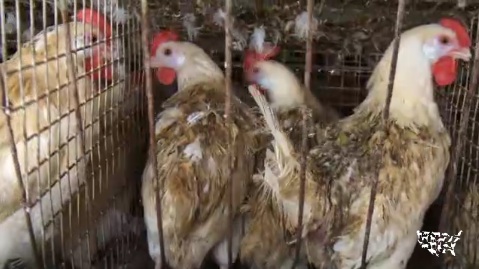Casual observers of this year’s enormous salmonella-tainted egg recall can be forgiven for assuming that the whole affair stemmed from the actions of a single villain: Jack DeCoster, the now-notorious owner of a nationwide web of animal factories and “habitual violator” of laws.
Granted, DeCoster’s misdeeds — which date to the ‘80s — would make those of a fox loose in a packed henhouse look tame by comparison.
But a growing weight of evidence suggests that DeCoster plys his trade amid a fundamentally corrupt system — one in which the abuse of animals and the menacing of public health is the rule and not the exception.
Well before DeCoster made national news this past summer, the Humane Society of the United States managed to plant a worker in egg factories run by of the nation’s largest producers: Rose Acre Farms and Rembrandt. The worker witnessed — and documented — a range of abuses at both operations, including:
- Prolapsed uteruses: Hens suffer from “blow-outs” that go unnoticed and untreated due to the cage crowding.
- Trapped birds unable to reach food and water: Battery cages can trap hens by their wings, necks, legs, and feet in the wire, causing other birds to trample the weakened animals, usually resulting in a slow, painful death.
- High mortality in layer and pullet sheds: The HSUS investigator pulled dead young hens, some of them mummified (meaning they’d been rotting in the cages for weeks), from cages every day.
- Failure to maintain manure pits: According to one worker, the manure pit under a pullet shed had not been cleaned in two years. Rose Acre workers claimed that some hens are blinded because of excessive ammonia levels.
- Abandoned hens: Some hens manage to escape from their cages and fall into the manure pits below.
And then, in the summer, DeCoster and his cronies released a half-billion tainted eggs into the system. After the fact, FDA inspectors entered the facilities — and found conditions remarkably similar to what the Humane Society investigator found at Rose Acre and Rembrandt.
And now the Humane Society is back, this time landing a plant at Cal-Maine Foods, supposedly the largest U.S. egg producer. Again, conditions are revealed to be grim. (Full report here [PDF].) To wit:
- Birds producing eggs for human consumption confined in overcrowded cages with the rotting corpses of other birds.
- Dead hens, trapped under their cages, had died with their heads on the egg conveyor belts exposing passing eggs to the decaying bird.
- Birds trapped by their wings, necks and legs in the thin, rusty wires of the battery cages.
- Birds with severely injured legs, unable to reach food or water.
- Birds suffering from severe, bloody uterine prolapses enduring the pain of other hens in the overcrowded cages stepping on them.
- Eggs covered in feces and blood.
At this point, essentially all of the nation’s largest egg producers have been busted abusing hens and exposing the public to deadly pathogens. The problem is structural: They make money on volume, under intense pressure to cut costs. Treating hens decently is more expensive than abusing them like cheap industrial inputs. Until our regulatory agencies can come to grips with the highly consolidated nature of the food system, fundamental food-safety reform will remain a mirage — like the idyllic farm scenes pictured on cartons of industrial eggs.




